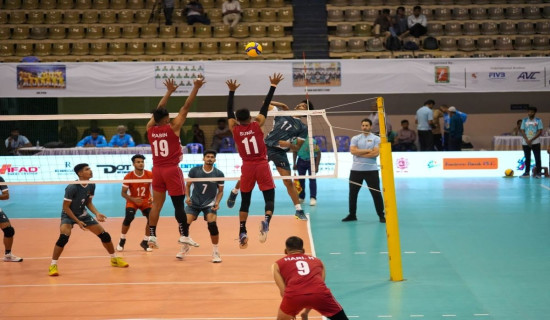- Saturday, 25 October 2025
Shifting Sands Of International Politics
World politics marks a great transformation. The geopolitical trajectory of three superpowers - the USA, China and Russia - and their shifting ties show a big picture of this transformation. The stabilisation of their roles in the future will decide the fate of the institutions of global governance. The progress in USA-Russia ties has inspired a change in other strategic areas. It has shifted the security commitment of the US to Europe. It, however, does not signify any change in Russia’s ties with its close allies. The US, too, operates its military bases in over 80 nations of the world. It is a leader of NATO and devises policies to counter China’s rapid rise through the Indo-Pacific Strategy, QUAD and bilateral security pacts. For the majority of nations, what matters is not the direction of this transformation but the upbeat payoffs it provides for their survival, prosperity and peace.
Great powers are defining their worldviews, narrating their position in the historical context, framing debates and looking for ways as to how internal and foreign policy coherence can help them to sail in the winds of transformation. Leaders, think tanks and track-two processes are pondering over the suitability of values and institutions all nations conform to in their diplomatic practices, seeking to underscore optimal strategy under conditions of uncertainty and providing inputs to reshaping global politics.
A flurry of initiatives
US President Donald J. Trump has set off a flurry of initiatives of global consequences. The US Secretary of State Marco Rubio has affirmed the multipolarity of world order, considering it “not an abandonment of our principles…[but] foreign policy has always required us to work in the national interest,” or America First, not liberal world order defined by democratic solidarity or global responsibilities. Despite huge transformation in the conditions of global politics, the behaviour of nation-states has not moved beyond the national interest-driven patterns of cooperation, competition and conflict. It turns the edifice of international security and peace less robust with uneven choices for various scales of nations. Reconciling diverse lenses on multipolar world order requires shared goals, norms, institutions and procedures agreed by all nations.
Hugo Grotius believes that international laws are critical to create an order among the society of sovereign states and mechanism of conflict resolution based on reason and pragmatism. The transformation in the conditions of world politics marks an end to an uni-polar world order with the unquestioned leadership of the US with central interest in security-military strength, technology, democracy, human rights and market economy and the ability to manage global governance through alliances with the nations in various parts of the world and influence the decisions of international organisations such as the UN, WTO, World Bank and IMF. Obsessed with illegal immigration, trade deficits, tariffs and debts, Trump has deep scorn for security alliances with Europe and thus turned to Russia for peace. Europe, too, claimed its sovereignty in response to alienated America and rising China.
In a rule-based multi-polar order, even great powers face limits. It provides small states some room for manoeuvre. The foundation of the UN system now suffers from legitimacy for its lack of fair regional representation in the Security Council and effectiveness owing to lack of required resources. The waning US support to its specialised agencies hit their efficacy. A new world order project is required to provide credence to new international relations based on national sovereignty where pooling of sovereignty is required for the management of global issues such as climate change, risk of nuclear war, terrorism, anti-systemic movements, cyber security, militarization of space, migration, hunger, climate change and the dispensation of global common goods. The interdependence of nations on many meta issues entails cooperation and the use of diplomacy to manage competition and conflict.
China’s perception of a multi-polar world means equality among all nations regardless of size, equal voice in multilateral institutions, and an ability to pursue their independent path of progress without foreign intervention. The record economic, technological, political and diplomatic niches of China lead in manufacturing and industrial products, innovation, artificial intelligence, quantum computing and biotechnology and its pursuit of national rejuvenation through connectivity are reshaping global politics. It deems the Belt and Road Initiative (BRI) as a bridge of China to the whole world based on the win-win cooperation. The Munich Security Conference 2025 of Atlantic nations affirmed the world’s ‘multipolarisation’ as a fact of global politics in which “multiple order models co-exist, compete, or clash.” Europe is defining its post-American future in security, trade and international relations. Canada, India and Latin America appear on top of its ties. The EU-South Africa Free Trade Agreement promotes economic and trade relations by eliminating tariffs and trade barriers.
The increase of new international regimes marks the beginning of a new form of multilateralism. The Shanghai Cooperation Organisation acquires the spirit to move ahead. The Global South - BRICS, New Development Bank and Asian Infrastructure Investment Bank - aims to create a new payment system and trade in national currencies. The share of BRICS in the total output of the world is 35 per cent. The share of the G7 club of wealthy nations is 28 percent. It implies the decline of American hegemony on the international financial system and its dollar though 85 per cent of global trade is still done with the dollar. The USA perceives the ascent of China as a strategic competitor shaping the geopolitical landscape, shoring up its global initiatives and replacing leadership in global institutions left void by the US departure.
America finds common cause with Sino-phobic nations, imposing tariffs and restricting the sale of advanced chips and technology to China. The pivoting of the USA to the Indo-Pacific is perceived by China as a strategy to control waterways and rim land, restrict the flow of energy and tradable goods and reduce its growing clout. The protectionist sentiment of the USA and its European and Asian allies’ prolonged economic sanctions against Russia forced it to turn to Asia. The trilateral meeting of Russia, China and Iran has suggested the US to give up its economic sanctions and enter into negotiation with Iran. Iran has also shown eagerness to cooperate with the UN nuclear watchdog. The growing ties between the USA and Russia are expected to stabilise the volatile geopolitics of West Asia and improve ties among Saudi Arabia, Israel and Iran.
It can ease the peace process in Ukraine where major powers, such as the UK, France, Poland and Germany, have converging interests to protect themselves from Russia and stuff the defense capabilities of Ukraine through “sky shield” to ensure its sovereignty. Opposing the Russian proposal for the demilitarisation of Ukraine, Europe is rearming with its nuclear deterrent ability, which may damp the hope of sustainable peace. The shuttle diplomacy of the US needs to reconcile irreconcilable conditions set by Russia, Ukraine and European nations.
The EU-Russia relations are locked in a mutual fear and security dilemma. Both oppose each other’s conditions for a ceasefire, low-trust in diplomacy and inflict mutual harm. This has frozen Ukraine in a state of deadlock. The far-right parties of Asia and Europe want to rebuild ties with Russia and the US. Refusing the EU’s 800 billion Euro defense plan, Hungary is drifting to China and Russia so that it can shape its own destiny. Frustrated by the excessive tariff regime, Austria is turning to China for its open market and free trade. China does not want to ditch Russia for the European condition but, like India, wants to continue with long-term cooperation and diversify trade and strategic cooperation with various poles of power. India has entered into mutually beneficial trade cooperation with the UK, the EU, Mauritius and New Zealand while also cultivating ties with the East Asian nations and steaming ahead in solidarity with BRICS and SCO.
The Sino-Russian strategic partnership dominates the geopolitical heartland of the world. Russia’s increased interest in West Asia and America and Israel’s hostile engagement with Iran and its proxies, Lebanon, Syria and Palestine have turned the region geopolitically shaking. Turkey’s engagement in Syria has added further weight to this complexity. The USA and Europe are awakened from the effects of the shift of global chains of production and distribution to developing nations. Both sense that the political bargaining conditions of workers are weak and ineffective and that political structures are dominated by the privileges of the leadership, which the people deeply detest. The tension between traditional politics of elites and modern aspirations of people will pivot politics into a combustible turn, enabling the predatory powers to disrupt buffer zones, shatter zones and the local balance of power.
The reorientation of American foreign policy to its core interests means the exercise of its hegemony in the Western hemisphere through coercive diplomacy. The US changed the name of the Gulf of Mexico to the Gulf of America. Its planned actions to integrate Canada, which it dropped later, occupy Greenland and control Panama affronts the Westphalian sovereignty of states. By dismantling the principles of free trade espoused by the WTO and trans-Atlantic security alliance, the USA is attracted to the Russian offer of collaboration on rare earth minerals. It wants to improve its own production, reindustrialisation, immigration control, economic growth and innovation to control crippling inflation and contribute to job creation.
US policy shift
Its economic tool of global influence, USAID, is, therefore, dismantled while aid is suspended for three months, aiming to improve its own economic clout, invest in manufacturing and AI and erase the deep state acting like white elephants. It is affecting the development of many nations and people in the world and straining the world business. The American policy shift from over-stretching to retrenchment has created a strategic vacuum to be filled by aspiring powers. The declining American interest in the UN and withdrawal from some of its specialized agencies pose multi-faceted problems in the world where global governance is required to solve them. Resource crunch stifles the will of the UN to execute the Sustainable Development Goals, humanitarian support and peace building activities.
The resetting of US-Russia relations has forced many nations to reconsider all their options and think outside this frame in matters of innovation, production and market access. China, Russia, Japan and India have a common ideological sentiment to support the decolonisation of Africa. Africans are uniting for the revitalisation of a promised future, not a cursed land. Asian, African and Latin American nations look for culturally embedded polity and development and an escape from the deeply entrenched dependency theory so that even the small states can self-determine their internal and external policy priorities.
(Former Reader at the Department of Political Science, TU, Dahal writes on political and social issues.)

















